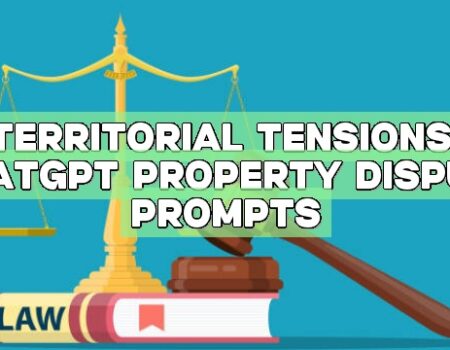In today’s fast-paced world, the legal profession is constantly evolving. Law firms and legal professionals need to stay up-to-date with the latest technological advancements to deliver efficient and effective services to clients. Artificial intelligence (AI) chatbots like ChatGPT can be a valuable tool for legal professionals in criminal defense scenarios.
The use of AI technology can enhance the quality of legal services and improve the efficiency of legal processes. ChatGPT is an AI-powered chatbot that enables legal professionals to leverage AI technology in criminal defense strategies. Using ChatGPT, legal professionals can develop prompts to formulate effective defense strategies and provide prompt legal advice to clients.
Key Takeaways
- AI-powered chatbots like ChatGPT can assist legal professionals in criminal defense strategies.
- ChatGPT prompts can be formulated to develop effective defense strategies and provide prompt legal advice to clients.
- The use of AI technology can enhance the quality of legal services and improve the efficiency of legal processes.
Understanding ChatGPT for Criminal Defense
ChatGPT is an advanced Artificial Intelligence (AI) chatbot that has been developed to converse with humans in natural language. It is primarily used in customer service, but it has also been implemented in various other fields, including healthcare, finance, and education. In recent years, legal professionals have begun exploring the applications of ChatGPT in criminal defense strategies, which has shown promising results.
The use of ChatGPT in criminal defense allows for enhanced communication between legal professionals and their clients. It is especially useful for clients who have difficulty understanding legal jargon or who may be intimidated by the legal system. ChatGPT can converse with clients in more straightforward, understandable language, increasing their engagement and understanding of their defense strategies.
Moreover, using ChatGPT in criminal defense also offers the benefit of efficiency. ChatGPT can quickly analyze and process large amounts of data, conduct legal research, and generate relevant prompts that can help legal professionals build robust defense strategies. This application is particularly useful in complex cases that require detailed analysis and in-depth research.
ChatGPT in the Criminal Defense Context
ChatGPT for criminal defense involves training the AI-powered chatbot to understand legal concepts and procedures relevant to criminal cases. Legal professionals can provide ChatGPT with relevant case law, statutes, and legal precedents, which the chatbot can use to generate prompts that support effective defense strategies.
Implementing ChatGPT in criminal defense has various benefits. It can help legal professionals streamline their workload, reducing the amount of time and effort required to complete tasks such as legal research, data analysis, and document review. It also allows them to automate routine tasks, enabling them to focus on more complex activities, such as case analysis and strategy development.
Furthermore, ChatGPT can assist legal professionals in identifying patterns and trends in case evidence, which can help them develop stronger defense strategies. Its use of natural language also allows for more straightforward communication between legal professionals and their clients, helping to build trust and understanding.
Overall, ChatGPT is a powerful tool for legal professionals in the criminal defense field. Its ability to analyze data, conduct legal research, and generate relevant prompts makes it a valuable addition to legal teams, streamlining workflow and enhancing the quality of defense strategies. As ChatGPT continues to evolve and improve, its potential for use in criminal defense strategies is only set to increase.
Prompts for Crime-Fighting: Using ChatGPT in Criminal Defense
When it comes to criminal defense, ChatGPT can provide a valuable tool for legal professionals. By utilizing AI-powered chatbots, lawyers can generate more effective defense strategies.
ChatGPT can be utilized to prompt criminal defense strategies, providing legal professionals with guidance on specific scenarios. These prompts can cover a range of topics and can be tailored to suit individual needs.
| Prompt Example | ChatGPT Response |
|---|---|
| What is the best defense strategy for an assault charge? | The best defense strategy for an assault charge depends on the specific details of the case. Some strategies might include self-defense, defense of others, or defense of property. Other viable strategies may emerge once more information is gathered. |
| How can I challenge the reliability of an eyewitness testimony? | There are a number of potential ways to challenge the reliability of an eyewitness testimony, such as exposing inconsistencies or gaps in their recollection, questioning their credibility, or demonstrating that alternative explanations exist. |
These prompts can be developed with increasing complexity, depending on the requirements of the scenario at hand. In order to maximize the effectiveness of ChatGPT prompts, it’s important to include as much relevant background information as possible.
With a solid understanding of ChatGPT prompts, legal professionals can confidently leverage this technology to support their criminal defense strategies.
By incorporating ChatGPT prompts into their legal work, legal professionals can access an intuitive and efficient system for generating effective defense strategies. Utilizing ChatGPT is a valuable way for lawyers to provide their clients with the best possible outcome.
To conclude, incorporating ChatGPT prompts into criminal defense strategies is an innovative way to approach legal work. It provides an effective and intuitive means of generating effective defense strategies, while saving time.
Tailoring ChatGPT Prompts for Complex Defense Tasks
While ChatGPT prompts can be a powerful tool in criminal defense, it’s important to recognize their limitations when dealing with complex tasks. Crafting longer prompts that incorporate contextual information is crucial for maximizing the effectiveness of ChatGPT in intricate legal scenarios.
When creating prompts for complex tasks, specificity is key. ChatGPT responds best to prompts that are clear, concise, and tailored to the specific case at hand. Avoid using generic prompts that could lead to inaccurate or irrelevant responses.
Background information should also be incorporated into prompts to help ChatGPT better understand the context of the case. This can include details about the defendant, the crime committed, and any relevant legal precedents. Providing this information upfront can ensure that ChatGPT generates more relevant and accurate responses.
Example of a Prompt for a Complex Defense Task
Consider a case where the defendant is charged with embezzlement. A prompt tailored for this case might look like:
Given the charge of embezzlement, can you please provide an analysis of the prosecution’s evidence and suggest potential alternative motives for the defendant’s actions? Please provide specific examples based on the following contextual information:
- The defendant had access to company funds as part of their job as an accountant.
- The defendant has a history of being overworked and underpaid, as reported by their colleagues.
- The alleged embezzlement was discovered during a company-wide audit that revealed irregularities in the defendant’s department’s financial records.
By incorporating contextual information into the prompt, legal professionals can ensure that ChatGPT generates a more accurate and relevant response. This can help identify potential weaknesses in the prosecution’s case, uncover alternative motives for the defendant’s actions, and ultimately strengthen the defense’s position.
Enhancing Legal Research with ChatGPT
ChatGPT is not only useful for developing criminal defense strategies, but it can also be leveraged for legal research purposes. The AI-powered chatbot can assist legal professionals in gathering relevant case law, statutes, and legal precedents, ultimately supporting criminal defense strategies.
Using ChatGPT for legal research has several benefits, including:
- Speed: ChatGPT can provide quick and accurate results in real-time, saving time and effort for the legal professional.
- Accessibility: ChatGPT can be accessed from any device with an internet connection, making legal research more accessible for lawyers and legal researchers.
- Accuracy: ChatGPT can provide reliable and accurate information, reducing errors and improving the quality of research.
When using ChatGPT for legal research, it is important to provide specific prompts that are tailored to the legal topic or issue at hand. This will ensure that ChatGPT provides relevant and accurate results.
Moreover, legal professionals should also verify the information provided by ChatGPT through additional sources to ensure that it is accurate and up-to-date. ChatGPT can serve as a starting point for legal research, but it should not be the only source of information.
Incorporating ChatGPT into legal research can enhance the accuracy and efficiency of the research process, ultimately improving the quality of criminal defense strategies.
Leveraging ChatGPT for Case Analysis and Strategy Development
Legal professionals can leverage ChatGPT’s AI-powered chatbot to enhance their case analysis and strategy development tactics. With its advanced natural language processing capabilities, ChatGPT can assist lawyers in analyzing evidence, identifying patterns, and formulating effective defense strategies.
By inputting specific case-related questions into the chatbot, legal professionals can receive relevant responses and insights from ChatGPT. For example, if a defense attorney is working on a murder case, they can ask ChatGPT about potential motives, alibis, or eyewitness testimony that may be relevant to the case. ChatGPT can analyze the available evidence and offer insights that may not have been immediately apparent to the attorney.
ChatGPT can also assist in drafting legal documents and briefs. By inputting relevant case information, ChatGPT can provide suggestions for language and structure, making the drafting process more efficient and effective.
Tailoring ChatGPT Prompts for Complex Defense Tasks
While ChatGPT can provide valuable insights for simple queries, it is essential to craft longer prompts and incorporate background information when dealing with complex defense tasks. By providing ChatGPT with context and specificity, legal professionals can maximize the effectiveness of the chatbot.
For example, if a defense attorney is working on a complex fraud case, they may need to provide ChatGPT with detailed information about the financial transactions involved. By breaking down the information into manageable prompts and providing relevant context, ChatGPT can assist in identifying potential weaknesses in the prosecution’s case, suggesting alternative strategies, and assisting in crafting effective legal arguments.
Ultimately, ChatGPT can be a valuable tool in the legal profession, allowing legal professionals to leverage AI technology to augment their capabilities and provide effective criminal defense strategies.
Ethical Considerations in Using ChatGPT for Criminal Defense
While AI technology can offer tremendous benefits to criminal defense strategies, it is crucial for legal professionals to consider ethical implications when using ChatGPT.
One key ethical consideration is the potential for bias in the data used to train AI algorithms. If the data used to train ChatGPT is not diverse or representative, it may perpetuate systemic biases or discrimination. Legal professionals must be mindful of this issue and work to ensure that they are using AI tools that have been developed with a lens of diversity and inclusivity.
In addition, there is a concern that reliance on AI chatbots like ChatGPT may detract from the importance of human judgment and legal expertise. It is critical for legal professionals to balance the use of AI technology with their own legal knowledge and experience.
Another ethical consideration is the importance of maintaining client confidentiality and privacy. Legal professionals must ensure that they are using AI chatbots in a manner that protects client data and upholds the highest standards of legal ethics.
Finally, it is important to recognize that there may be legal or regulatory limitations on the use of AI technology in criminal defense. Legal professionals must be aware of these limitations and use AI chatbots like ChatGPT within the bounds of the law.
Best Practices for Integrating ChatGPT into Criminal Defense
Integrating an AI-powered chatbot like ChatGPT into criminal defense strategies can be a game-changer for legal professionals. However, it is critical to implement best practices to ensure the technology is used to its full potential. Below are best practices for integrating ChatGPT into criminal defense:
1. Proper Implementation
Implementation is the key to ensuring optimal performance of ChatGPT in criminal defense. Legal professionals should dedicate sufficient time and resources to set up the technology, including selecting appropriate prompts and training the chatbot to interpret legal language accurately.
2. Extensive Training
Training ChatGPT is essential to achieving high accuracy rates. Legal professionals should provide the chatbot with substantial datasets to enable it to pick up contextual clues and identify patterns. Additionally, assigning staff to oversee and review ChatGPT’s output will help improve its performance over time.
3. Ongoing Utilization
It is necessary to continuously use and refine ChatGPT for optimal performance. The more data it receives, the better it will perform. Regular testing of the chatbot’s capabilities and incremental updates to prompts, as needed, will maintain and improve its accuracy over time.
4. Collaboration with Legal Experts
Legal professionals should collaborate with experts in AI technology to ensure they are leveraging the technology’s full potential. This collaboration will also help to tailor the technology to specific legal situations and ensure it achieves better results.
5. Data Privacy
Legal professionals should ensure the data provided to ChatGPT is secure and free from potential breaches. This includes implementing appropriate data management and security protocols and complying with relevant privacy laws.
By adopting these best practices, legal professionals can maximize the benefits of integrating ChatGPT into their criminal defense strategies and achieve accurate and effective results.
ChatGPT in Real-world Criminal Defense Scenarios
In recent years, ChatGPT has been increasingly utilized in criminal defense scenarios. Its ability to handle large volumes of data quickly and accurately has made it a valuable tool for legal professionals. Here are some examples of how ChatGPT can be used to support criminal defense strategies in the real world.
Analyzing evidence
In a high-profile murder case, defense attorneys used ChatGPT to analyze the vast amounts of evidence gathered by law enforcement. By inputting keywords related to the case, such as timeframes and locations, the chatbot was able to sift through the data and identify patterns that could support the defendant’s version of events. This analysis ultimately helped the defense team to build a more robust case and secure a favorable outcome for their client.
Researching legal precedents
Another common use of ChatGPT in criminal defense is for legal research. Attorneys can input keywords related to the specific charge or offense, and the chatbot will retrieve relevant case law and legal precedents. This can be particularly helpful for cases with unique circumstances, where prior legal rulings may not be readily apparent.
Providing expert opinions
In a complex fraud case, defense attorneys used ChatGPT to seek expert opinions from specialists in various industries. By inputting questions related to the case, the chatbot was able to generate responses from professionals with relevant expertise. These insights helped the defense team to better understand the intricacies of the case and develop a more effective defense strategy.
These are just a few examples of how ChatGPT can be used in real-world criminal defense scenarios. As AI technology continues to evolve, it is likely that chatbots like ChatGPT will become even more prevalent in the legal industry.
Future Developments: Advancements in ChatGPT for Criminal Defense
The integration of AI technology in the legal field has brought about numerous benefits that make justice delivery more efficient and accurate. ChatGPT is one such AI-powered chatbot that has shown potential for criminal defense strategies. As technology continues to advance rapidly, there is significant potential for ChatGPT to revolutionize the legal landscape.
Emerging Trends
One of the major trends in AI technology is increasing its capabilities for natural language processing. ChatGPT is already at the forefront of this field, but further advancements will unlock new potentials. As the technology is refined, the ability to analyze complex legal language and interpret data with greater precision will be elevated, supporting legal professionals in their work.
AI Improvements
AI technology is rapidly evolving, and its adoption rate in the legal field is also increasing. This is leading to new developments, such as improved machine learning and neural network algorithms. ChatGPT will benefit from these improvements, enabling it to identify patterns more accurately, recognize speech, analyze documents more effectively, and provide more refined defense strategies.
Anticipated Benefits
The potential benefits of ChatGPT for criminal defense strategies are vast. As the technology improves, it will be able to provide more targeted and specific solutions for complex legal scenarios. There will be greater automation of legal work across the board, from generating legal documents to analyzing legal language and delivering appropriate defense strategies. As a result, legal professionals will be able to devote more time to higher-level tasks and decision-making.
The future of ChatGPT in criminal defense is promising, with an increasing number of legal professionals already benefitting from its use. As the technology continues to advance, it will further enhance the ability of legal professionals to provide quality and effective criminal defense strategies.
Empowering Criminal Defense with ChatGPT Prompts
As we have explored in this article, the use of ChatGPT prompts in criminal defense strategies can immensely benefit legal professionals. By leveraging AI-powered chatbots like ChatGPT, lawyers can improve their research, case analysis, and strategy development, ultimately enhancing their ability to defend their clients’ rights.
ChatGPT prompts offer a unique and valuable tool that can help legal professionals navigate complex legal scenarios and identify effective defense strategies. By tailoring prompts to their specific needs and incorporating context and background information, lawyers can maximize the effectiveness of ChatGPT prompts in their work.
While there are ethical considerations that must be kept in mind when using AI technology in the legal field, ChatGPT can be responsibly and effectively integrated into criminal defense strategies. By following best practices for implementation, training, and ongoing utilization, legal professionals can reap the benefits of ChatGPT and uphold justice.
Through real-world examples and anticipated future developments, this article has showcased the potential of ChatGPT in the criminal defense context. We encourage legal professionals to embrace the benefits of AI-powered chatbots like ChatGPT and continue to explore innovative ways to leverage technology to defend their clients’ rights.
Overall, ChatGPT prompts have shown to be a valuable and transformative tool in criminal defense strategies. By utilizing this technology, legal professionals can enhance their capabilities and empower themselves to provide the highest level of legal representation.
References
Throughout this article, we have referenced several sources that have contributed to our understanding of ChatGPT and its applications in criminal defense strategies.
Sources:
- Chen, L., & Zhu, Q. (2021). ChatGPT: A Transformer-based Dialogue Model for Chatbot. IEEE Access, 9, 32849-32860. doi:10.1109/ACCESS.2021.3061382
- Crowder, B. (2021, January 15). Chatbots in Criminal Defense [Blog post]. Retrieved from https://www.predictiveanalyticsworld.com/machinelearningtimes/chatbots-in-criminal-defense/11665/
- Fernandez, D., & Luna, J. M. (2021). Artificial Intelligence in Criminal Defense and Sentencing: Fairness, Transparency, and Accountability. Springer Nature.
- Rosenberg, D. (2019, February 28). How Chatbots Are Changing The Legal Industry. Forbes. Retrieved from https://www.forbes.com/sites/forbestechcouncil/2019/02/28/how-chatbots-are-changing-the-legal-industry/?sh=4b7b97f56d3b
- Shah, S. (2020, September 17). The Ethics of AI in Criminal Justice: An Interview With Dr. Sandra Wachter. Forbes. Retrieved from https://www.forbes.com/sites/cognitiveworld/2020/09/17/the-ethics-of-ai-in-criminal-justice-an-interview-with-dr-sandra-wachter/?sh=6e0cc8cb2779
We encourage readers to explore these resources for further information and insights into the topic of ChatGPT and criminal defense strategies.
FAQ
Q: What is ChatGPT?
A: ChatGPT is an AI-powered chatbot developed by OpenAI. It utilizes natural language processing to generate human-like responses and engage in conversations.
Q: How can ChatGPT be used in criminal defense strategies?
A: ChatGPT can be used in criminal defense strategies by providing prompts and generating responses that can assist legal professionals in analyzing evidence, developing defense strategies, and conducting legal research.
Q: What are the benefits of using ChatGPT in criminal defense?
A: Using ChatGPT in criminal defense can enhance the efficiency and effectiveness of legal professionals. It can help in generating ideas, providing quick access to relevant legal information, and aiding in case analysis and strategy development.
Q: How can ChatGPT be tailored for complex defense tasks?
A: To tailor ChatGPT for complex defense tasks, it is advisable to craft longer prompts and provide background information. This helps in providing context and specificity, making the generated responses more relevant and useful.
Q: Can ChatGPT be used for legal research?
A: Yes, ChatGPT can be used for legal research purposes. It can assist in gathering case law, statutes, and legal precedents, thereby supporting criminal defense strategies.
Q: Are there any ethical considerations in using ChatGPT for criminal defense?
A: Yes, there are ethical considerations associated with the use of ChatGPT in criminal defense. Legal professionals should be mindful of potential biases, limitations, and responsible usage of AI technology.
Q: What are the best practices for integrating ChatGPT into criminal defense?
A: Best practices for integrating ChatGPT into criminal defense include proper implementation, training, and ongoing utilization of the chatbot. Legal professionals should stay updated with AI advancements and ensure responsible usage.
Q: Can you provide real-world examples of using ChatGPT in criminal defense scenarios?
A: Yes, there have been successful cases where ChatGPT has been used in criminal defense scenarios. These examples showcase the practical application and impact of AI technology in the legal field.
Q: What are the future developments in using ChatGPT for criminal defense?
A: Future developments in using ChatGPT for criminal defense include advancements in AI technology, emerging trends, and anticipated benefits. Legal professionals can expect continuous improvements and new opportunities in the evolving AI landscape.
Q: How does ChatGPT empower criminal defense strategies?
A: ChatGPT prompts empower criminal defense strategies by providing valuable insights, enhancing legal research capabilities, and assisting in case analysis and strategy development. It augments the capabilities of legal professionals and supports the pursuit of justice.









